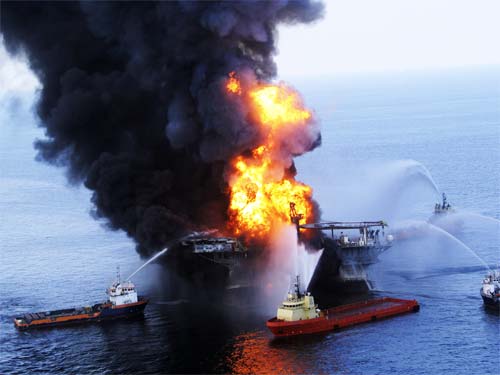Another lesson in how an apparent off-the-cuff assumption can become fact, even in this age of instant fact-checking and collaborative research. The New York Times reports:
Two weeks ago, the government put out a round estimate of the size of the oil leak in the Gulf of Mexico: 5,000 barrels a day. Repeated endlessly in news reports, it has become conventional wisdom.
But scientists and environmental groups are raising sharp questions about that estimate, declaring that the leak must be far larger. They also criticize BP for refusing to use well-known scientific techniques that would give a more precise figure.
The figure of 5,000 barrels a day was hastily produced by government scientists in Seattle. It appears to have been calculated using a method that is specifically not recommended for major oil spills.
One of the news reports that repeated the 5,000 barrels/day number was the New York Times itself, which used it as the central assumption in an A1 story that tried to make the case that the spill really wasn’t all that bad
Yes, at just 5,000 barrels, BPs spill wouldn’t make it nearly the worst. But the Times was a little quick to go against the grain their analysis was based on a number that had even been doubted by non-industry experts.
(It also didn’t help that one of groups they quoted downplaying the spill was, as my colleague Marian Wang pointed out, bosom buddies with the drilling industry.)
Now it turns out the 5,000-barrel estimate may be so flawed that the National Oceanic and Atmospheric Administration wouldn’t even tell the Times the numbers it used to make that guess:
The 5,000-barrel-a-day estimate was produced in Seattle by a NOAA unit that responds to oil spills. It was calculated with a protocol known as the Bonn convention that calls for measuring the extent of an oil spill, using its color to judge the thickness of oil atop the water, and then multiplying.
However, Alun Lewis, a British oil-spill consultant who is an authority on the Bonn convention, said the method was specifically not recommended for analyzing large spills like the one in the Gulf of Mexico, since the thickness was too difficult to judge in such a case.
Even when used for smaller spills, he said, correct application of the technique would never produce a single point estimate, like the government’s figure of 5,000 barrels a day, but rather a range that would likely be quite wide.
NOAA declined to supply detailed information on the mathematics behind the estimate, nor would it address the points raised by Mr. Lewis.
